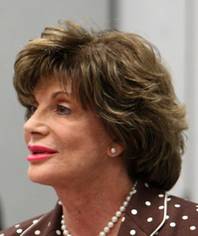Sunday, Oct. 11, 2009 | 2 a.m.
Sun Archives
- Is Harry Reid moderate on health care, or keeping powder dry for final fight? (10-4-2009)
- What cuts in Medicare would mean for seniors (10-4-2009)
- John Ensign scores win with health care amendment (10-1-2009)
- John Ensign: Public option would be popular, so let's not do it (9-30-2009)
- Harry Reid: 'I make no apologies' on Medicaid deal (9-30-2009)
- Protesters decry GOP stance on health care reform (9-29-2009)
- Bigger premium discounts seen as a reward -- and a problem (9-27-2009)
- Harry Reid: Public option trigger 'pretty doggone good idea' (9-25-2009)
Sun Blogs
Beyond the Sun
- The Wall Street Journal: Majority Of House Dems Oppose Tax On "Cadillac' Health Plans (10-6-2009)
- Politico: House Dems, labor, battle plan to tax benefits (10-6-2009)

Shelley Berkley

Dina Titus
Several years ago, when the powerful Culinary Union was negotiating new contracts on the Strip, its workers decided to forgo an initial pay increase to preserve their health care benefits.
The union offers its workers, who clean hotel rooms and work in casino restaurants, a great benefits package by many measures — workers pay no premium from their paychecks for a policy that covers themselves and their families.
Now, under the health care reform plan being debated in the Senate, those benefits could eventually be taxed to help raise money to cover the uninsured.
The proposed tax on insurers providing the so-called Cadillac health care plans would hit employer-provided policies that cost more than $8,000 a year for an individual or $21,000 for a family.
But as a New York Times headline read a few weeks ago, the proposal could also snare a few Chevys.
Higher-end policies are enjoyed not just by corporate executives, but also by middle-class union workers who have long negotiated for better benefits over pay. They’re also provided by many smaller companies, which tend to pay more for health coverage because they have fewer workers among whom to spread the risk.
The Culinary’s health benefits package costs the companies about $8,000 per full-time worker, right at the threshold for the tax and about double the average for an individual employer-offered health plan in Nevada.
Experts say any tax on the insurers, or the companies that insure workers through their own health care plans, would eventually trickle down to workers. The tax would almost certainly snare the Strip’s insurance plans as health care costs continue to rise.
As the Senate Finance Committee prepares to vote on the proposal next week, Nevada’s lawmakers are growing increasingly concerned about the Senate proposal to tax insurers that provide companies’ Cadillac plans.
Both of Nevada’s Democratic House members, Reps. Shelley Berkley and Dina Titus, signed a letter last week opposing the tax.
“A large percentage of the working men and women in Southern Nevada work with a union contract,” Berkley said. “Many of the negotiators sacrificed a higher wage for a better health care plan. To turn around and tax that now violates the contractual relationship between labor and management and goes back on a promise President Obama made that he would not increase taxes on the middle class.”
Titus, too, sees a business tax she cannot support. “Taxing insurance companies for high-cost insurance plans will only serve to place a greater burden on middle-class families,” she said.
The Culinary is not taking a position on the proposal, nor is the Nevada chapter of the AFL-CIO, which includes dozens of unions.
Throughout the health care debate, one vexing problem has been how to raise money to cover the uninsured.
Most of the nearly $1 trillion cost of health care reform will be to provide subsidies to help the uninsured buy policies they cannot now afford or to expand state Medicaid programs to provide the uninsured with coverage.
The House bills sought revenue by putting a new tax on people with high incomes.
Under the House bill, a 1 percent tax would be levied on incomes above $280,000 for an individual (or $350,000 for families), rising to 5.4 percent on families with incomes exceeding $1 million.
The Senate took a different route, narrowing in on health plans often seen as the domain of corporate executives who may enjoy gym memberships, sophisticated annual physicals or elective procedures. Taxing costlier health care plans is not only intended to raise revenue but also to lower overall health care spending by discouraging companies and their employees from using more health care than needed.
Workers have long enjoyed tax-free health care benefits from their employers — a perk that grew during World War II because of wage freezes.
Health experts believe this practice is one factor that is driving up the costs of health care: If workers have no skin in the game, they are apt to use more medical services than they would if they were paying for them.
“Individuals who have to pay little or nothing out of pocket for medical care are likely to overconsume such services,” said Leonard E. Burman, director of the Washington-based Tax Policy Center, during testimony before Congress this year.
Such a wide-reaching tax would violate President Barack Obama’s pledge not to raise taxes on those making less than $250,000 a year.
To sidestep that political pitfall, the Senate committee narrowed the concept to target only the high-end health care plans, while also proposing that the tax would fall not on the workers directly, but on the insurers (or in the case of companies that self-insure, the employers).
Under the Senate proposal, insurers would be hit with a 40 percent tax on the value of a health plan above $8,000 per person (or $9,850 for those over 55 years old, or in such high-risk fields as mining, construction and emergency services) and $21,000 per family policy (or $26,000 for families with older or high risk-workers). The tax would be on each dollar above the threshold.
Experts believe insurance companies or employers would simply pass the tax on to employees, which would reduce the popularity of the high-end plans and shift workers into less-costly policies that would bring health costs down overall.
The Congressional Budget Office estimates that the tax would raise $201 billion.
Actually, the revenue would come not from the tax itself, but from the presumed higher taxes workers and companies would pay on higher earnings, assuming that the money saved on health care as companies abandon high-end plans would be redirected to wages.
Estimates are the tax would hit one in six employer-sponsored health plans nationally, with the number growing to 40 percent in the next decade, according to the congressional Joint Committee on Taxation.
In Nevada, the average plan costs less than the threshold for the tax. The average costs of employer-sponsored health care in Nevada is about $4,000 for singles and $11,500 for family plans, slightly lower than average costs nationally, according to the Kaiser Family Foundation’s statehealthfacts.org.
Unions nationally argue that their workers would either have to swallow the tax or see their hard-fought benefits trimmed. They doubt companies would pass any savings on to workers in the form of higher pay.
Elise Gould at the liberal-leaning Economic Policy Institute said taxing the plans doesn’t necessarily reduce overall health spending as workers still need care whether they get it through their plan, pay for it out of pocket or show up at emergency rooms.
“What is a Cadillac plan? Do they cover gym memberships? At what point do we think that’s unnecessary?” Gould says. “There’s nothing to say when people move into a cheaper plan it’s a more efficient use of dollars.”
Berkley and Titus joined half the House Democrats in rejecting the Senate tax proposal, making its future uncertain as the bills from the two chambers eventually must be merged.
Nevada’s two House Democrats have been lukewarm to most of the revenue provisions in the bill.
Both Berkley and Titus rejected Obama’s initial proposal that money be raised by reducing tax deductions on mortgage interest and charitable donations for those in upper-income brackets.
More recently Titus became one of just a few Democrats to vote against the health care plan in committee because of the surtax proposed on those making $280,000 annually.
Democrats in the House have pulled away from that surtax, and are now considering taxing only those making above $500,000 annually.
Eventually, though, revenue will need to be raised if Congress hopes to expand care for the uninsured.
Nevada’s Republicans in Congress oppose the House and Senate bills.
Chuck Marr, director of federal tax policy at the Center for Budget and Policy Priorities in Washington, expects the so-called Cadillac tax will remain in some form in the final bill — perhaps by scaling it back to hit only those who are also upper-income earners.
“It’s hard to see any final bill happening that doesn’t have any version of this,” he said.

Join the Discussion:
Check this out for a full explanation of our conversion to the LiveFyre commenting system and instructions on how to sign up for an account.
Full comments policy